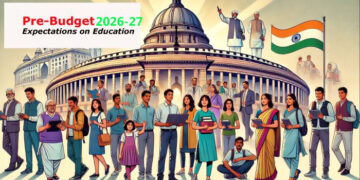By Akhand Swaroop Pandit
 In today’sunprecedent times,technology has become a part and parcel of our lives. From smart TVs, washing machines, laptops to smartphones, we are encompassed bya variety of gadgets powered by technology. In fact, newer technologies keep rolling out in the market regularly and make our lives better with each passing day. These technologies have its applications in every field and especially in the education sector. It is being exploited in classrooms to make learning fun by making the classrooms interactive. Advanced technologies make education easier, joyful and accessible.
In today’sunprecedent times,technology has become a part and parcel of our lives. From smart TVs, washing machines, laptops to smartphones, we are encompassed bya variety of gadgets powered by technology. In fact, newer technologies keep rolling out in the market regularly and make our lives better with each passing day. These technologies have its applications in every field and especially in the education sector. It is being exploited in classrooms to make learning fun by making the classrooms interactive. Advanced technologies make education easier, joyful and accessible.
EdTech: the next big thing
Due to the implementation of strict social distancing rules and subsequent slowdown in the economy,various industries were hit to the point of pay cuts and layoffs. However, the education sector continued to be growing. As one of the big bets for investors, education, especially EdTech, has recorded investments worth $1.1 billion in 2020, its highest-ever annual tally and four times compared to last year.
According to the latest reports, the global education technology market size is anticipated to reach USD 404 billion by 2025, growing at a CAGR of 16.3% from 2020 to 2025. Even at this level, EdTech and digital expenditure will only make up 5.2% of the $7.3T global education market in 2025 according to Holon IQ, the education market intelligence platform. The undeniable growth in the space will only further leverage the Indian education industry as a whole and how.
Education, which is often seen as the most important solution by families to alleviate poverty has become more important than ever.India,a large English speaking population with technology architecture and means, can allow its citizensto become global tutors not just for Indian students but also for counties like the US, UK, Australia, etc. This can be akin to the IT industry outsourcing for doubt-solving and low-cost course delivery for the global population.
The Government is gradually allowing schools to be reopened for students of classes 9-12 to help with doubt clearing and interaction on rotational basis. But since full-scale return to schools doesn’t look plausible in this academic year, it will continue to push online as a primary medium of instruction especially for primary and secondary levels.
EdTech may also leapfrog from chalkboard to whiteboard directly, especially for professional courses and higher education. With parents working from home and constraints on travel and other expenses, their involvement in student education will increase. Thus, home-schooling as a concept also has potential for growth.
The traditional education system is on a fast track to modernisation in even government schools and colleges and this trend will continue even if physical classes resume. Learning Management System (LMS) integration, digital exams, faster results will become the norm, paving the way for indigenous technology companies to develop and maintain these systems in institutions across the country and the world. Many parents who were previously guarded about digital tools and e-learning, experienced them and this has boosted both penetration and demand for such offerings.
Turning out to Classrooms 2.0
Although some might view technology as pervasive, for younger generations, it is ever-present.For the current generation of hyper active and digitally savvy children, the new technologies are expected to convertclassrooms of the future around self-paced and personalized learning.The future technologies are the best way to understand the diversity in learning styles as it encourages collaboration and enables classmates to interact more with each other.Additionally, adopting newer technologies help teachers to prepare their students to face the real world.It enables students to access up-to-date information in a quicker and easier way.Classroom technology has transformed teachers into encouragers, advisers and coaches.
Students can now easily find e-books, revision material, sample papers and previous year question papers on the internet that can be used to improve their knowledge base.The use of audio and visual materials make it easy for the student to grab theoretical concepts along with understanding the practical aspects. Apart from this, new technology has made it easier for disabled students to gain knowledge. They can use computers, visual material and many technological tools to learn despite their disability. There are arrays of effective and robust learning tools for differently-abled students.This student-centric approach would allow children to choose their own pace and learning objectives based on individual interests-all of which could be guided by artificial intelligence, chatbots, and video-based learning.
Artificial intelligence in education typically focuses on identifying what a student does or doesn’t know, and then subsequently developing a personalized curriculam for each student.AI-driven applications in education are still in their infancy, but there is a huge scope of growth potential in the sector. In fact, the nascent market for AI in education is expected to reach $6 billion by the year 2025.
Chatbots are also quickly becoming a fundamental tool in next generation education. Designed to simplify the interaction between student and computer, chatbots provide a wide range of benefits, including spaced interval learning, self-paced learning and by providing necessary feedback immediately.
Video-based learning, which although may not necessarily be considered as innovative as artificial intelligence or chatbots, 98% of educators view it as a vital component in personalized learning experiences. Most institutions report incorporating video into their curriculums in some way, but even higher demand for video-based learning may come from students in the near future.This is due to the fact that video learning increases student satisfaction by 91%, and student achievements by 82%, which could be why educators are increasingly using video for tasks like:
Creating First-Class Humans
To sum up, with the advent of technology, there has been a paradigm shift in the education sector. The traditional blackboard has been replaced by an interactive whiteboard.By exploiting technology, students can now connect with different people across the globe to receive better career opportunities beyond boundaries.Although we may not be in the era of iTeachers just yet, the benefits of technology as teaching aids are undeniable. However, what is more important is that these aids are used in tandem with developmental and educational psychology—ultimately keeping students rather than technology at the core of education.
(Author is CEO and Co-Founder, The Catalyst Group)













